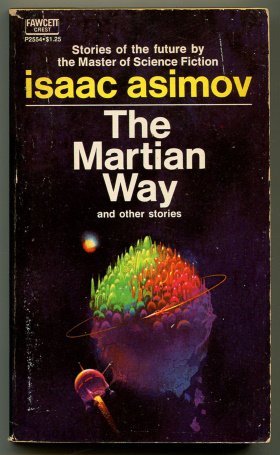‘And we can search your so-called teacher’s ‘country place,’ and see what we can find there.’
‘Well, not quite, Quinn.’ Byerley smiled broadly. ‘Unfortunately for you, my so-called teacher is a sick man. His country place is his place of rest. His Right of Privacy as a citizen of adult responsibility is naturally even stronger, under the circumstances. You won’t be able to obtain a warrant to enter his grounds without showing just cause. However, I’d be the last to prevent you from trying.’
There was a pause of moderate length, and then Quinn leaned forward, so that his imaged-face expanded and the fine lines on his forehead were visible, ‘Byerley, why do you carry on? You can’t be elected.’
‘Can’t I?’
‘Do you think you can? Do you suppose that your failure to make any attempt to disprove the robot charge-when you could easily, by breaking one of the Three Laws-does anything but convince the people that you are a robot?’
‘All I see so far is that from being a rather vaguely known, but still largely obscure metropolitan lawyer, I have now become a world figure. You’re a good publicist.’
‘But you are a robot.’
‘So it’s been said, but not proven.’
‘It’s been proven sufficiently for the electorate.’
‘Then relax – you’ve won.’
‘Good-by,’ said Quinn, with his first touch of viciousness, and the visorphone slammed off.
‘Good-by,’ said Byerley imperturbably, to the blank plate.
Byerley brought his ‘teacher’ back the week before election. The air car dropped quickly in an obscure part of the city.
‘You’ll stay here till after election,’’ Byerley told him. ‘It would be better to have you out of the way if things take a bad turn.’
The hoarse voice that twisted painfully out of John’s crooked mouth might have had accents of concern in it. ‘There’s danger of violence?’
‘The Fundamentalists threaten it, so I suppose there is, in a theoretical sense. But I really don’t expect it. The Fundies have no real power. They’re just the continuous irritant factor that might stir up a riot after a while. You don’t mind staying here? Please. I won’t be myself if I have to worry about you.’
‘Oh, I’ll stay. You still think it will go well?’
‘I’m sure of it. No one bothered you at the place?’
‘No one. I’m certain.’
‘And your part went well?’
‘Well enough. There’ll be no trouble there.’
‘Then take care of yourself, and watch the televisor tomorrow, John.’ Byerley pressed the gnarled hand that rested on his.
Lenton’s forehead was a furrowed study in suspense. He had the completely unenviable job of being Byerley’s campaign manager in a campaign that wasn’t a campaign, for a person that refused to reveal his strategy, and refused to accept his manager’s.
‘You can’t!’ It was his favorite phrase. It had become his only phrase. ‘I tell you, Steve, you can’t!’
He threw himself in front of the prosecutor, who was spending his time leafing through the typed pages of his speech.
‘Put that down, Steve. Look, that mob has been organized by the Fundies. You won’t get a hearing. You’ll be stoned more likely. Why do you have to make a speech before an audience? What’s wrong with a recording, a visual recording?’
‘You want me to win the election, don’t you?’ asked Byerley, mildly. ‘Win the election! You’re not going to win, Steve. I’m trying to save your life.’
‘Oh, I’m not in danger.’
‘He’s not in danger. He’s not in danger.’ Lenton made a queer, rasping sound in his throat. ‘You mean you’re getting out on that balcony in front of fifty thousand crazy crackpots and try to talk sense to them – on a balcony like a medieval dictator?’
Byerley consulted his watch. ‘In about five minutes-as soon as the television lines are free.’
Lenton’s answering remark was not quite transliterable.
The crowd filled a roped off area of the city. Trees and houses seemed to grow out of a mass-human foundation. And by ultra-wave, the rest of the world watched. It was a purely local election, but it had a world audience just the same. Byerley thought of that and smiled.
But there was nothing to smile at in the crowd itself. There were banners and streamers, ringing every possible change on his supposed robotcy. The hostile attitude rose thickly and tangibly into the atmosphere.
From the start the speech was not successful. It competed against the inchoate mob howl and the rhythmic cries of the Fundie claques that formed mob-islands within the mob. Byerley spoke on, slowly, unemotionally—
Inside, Lenton clutched his hair and groaned-and waited for the blood.
There was a writhing in the front ranks. An angular citizen with popping eyes, and clothes too short for the lank length of his limbs, was pulling to the fore. A policeman dived after him, making slow, struggling passage. Byerley waved the latter off, angrily.
The thin man was directly under the balcony. His words tore unheard against the roar.
Byerley leaned forward. ‘What do you say? If you have a legitimate question, I’ll answer it.’ He turned to a flanking guard. ‘Bring that man up here.’
There was a tensing in the crowd. Cries of ‘Quiet’ started in various parts of the mob, and rose to a bedlam, then toned down raggedly. The thin man, red-faced and panting, faced Byerley.
Byerley said, ‘Have you a question?’

























